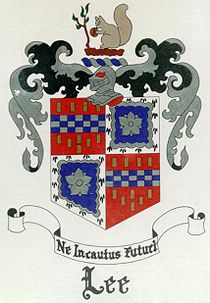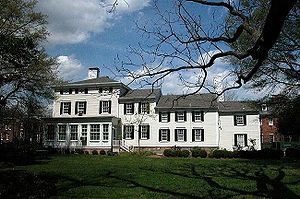
Edmund Jennings Lee I
Encyclopedia
Edmund Jennings Lee was a prominent legal and political figure in Alexandria, Virginia
. He was a member of the Lee family
of Virginia and lived for some time at the Lee-Fendall House
in Old Town Alexandria, Virginia.
and Lucy Grymes. More than any other member of the Lee family
, he was intimately involved in the economic and political fabric of Alexandria, Virginia
society. As a young man, he earned a law degree from Princeton University
. Upon returning to Alexandria, Lee began his own law practice and eventually became one of the most renown and erudite members of the bar. He argued cases not only at the local level, but was also a skilled Supreme Court
jurist.

Besides serving as Clerk of the Court and a trial attorney, Lee was also interested in the religious, educational, and social welfare of the community. Lee served on the vestry at Christ Church
for many years. He was appointed to the Board of Trustees of the Alexandria Academy in August 1818. Established in 1785, the Academy was one of Virginia's first free schools and was endowed by George Washington
at the time of his death in 1799. Also disturbed by the blight of slavery
and the deleterious effects it had on Southern society, Lee was one of the early members of the American Colonization Society
, which sought to ameliorate the conditions of local blacks.
. They had nine children: Edmund Jennings Lee, Jr. (1797–1877), Ann Harriotte (1799–1863), Sarah (1801–1879), William Fitzhugh (1804–1837), Hannah (1806–1872), Cassius Francis (b. 1808), Susan Meade (1814–1815), Charles Henry (b. 1818), and Richard Henry.
 The twilight years of Lee's life were spent quietly at the Lee-Fendall House
The twilight years of Lee's life were spent quietly at the Lee-Fendall House
, where he resided with his daughter Sally. He continued to attend to vestry and family business. Unfortunately, like other members of the family, Edmund Jennings Lee was haunted by financial adversity. The economic depressions of 1815, 1819, and 1837, coupled with the failure of the Bank of the United States
certainly contributed to the climate of economic malaise. Lee was also saddled with some of his brother's debts. In 1833, unable to meet the payment terms arranged during his purchase of the house, Lee was forced to sell the Lee-Fendall House at auction. In 1836, Lee's son, Edmund Jennings Lee, Jr. recovered the house. He allowed his father, mother, and sister to live in the old family home. By 1839, the elder Lee had recouped financially and was able to repurchase the Lee-Fendall House from his son, where he lived until his death on May 30, 1843. Edmund Jennings Lee's funeral service was held at the Lee-Fendall House and he was buried beside his wife, Sarah, at the Christ Church cemetery on Wilkes Street in Alexandria.
Alexandria, Virginia
Alexandria is an independent city in the Commonwealth of Virginia. As of 2009, the city had a total population of 139,966. Located along the Western bank of the Potomac River, Alexandria is approximately six miles south of downtown Washington, D.C.Like the rest of northern Virginia, as well as...
. He was a member of the Lee family
Lee family
The Lee family of the United States is a historically significant Virginia and Maryland political family, whose many prominent members are known for their accomplishments in politics and the military. Through the past few hundred years it was believed that Colonel Richard Lee of Virginia descended...
of Virginia and lived for some time at the Lee-Fendall House
Lee-Fendall House
The Lee-Fendall House is an urban plantation family home in Old Town Alexandria, Virginia. Since its construction in 1785 the house has served as home to thirty-seven members of the Lee family , hundreds of convalescing Union soldiers , the prominent Downham family , and powerful labor leader John L...
in Old Town Alexandria, Virginia.
Early Life and Career
Edmund Jennings Lee was born at Leesylvania plantation on May 20, 1772 and was the fifth son of Henry Lee IIHenry Lee II
Henry Lee II of “Leesylvania”, Prince William County, Virginia was the father of Henry "Light-Horse Harry" Lee III and grandfather of Robert E. Lee....
and Lucy Grymes. More than any other member of the Lee family
Lee family
The Lee family of the United States is a historically significant Virginia and Maryland political family, whose many prominent members are known for their accomplishments in politics and the military. Through the past few hundred years it was believed that Colonel Richard Lee of Virginia descended...
, he was intimately involved in the economic and political fabric of Alexandria, Virginia
Alexandria, Virginia
Alexandria is an independent city in the Commonwealth of Virginia. As of 2009, the city had a total population of 139,966. Located along the Western bank of the Potomac River, Alexandria is approximately six miles south of downtown Washington, D.C.Like the rest of northern Virginia, as well as...
society. As a young man, he earned a law degree from Princeton University
Princeton University
Princeton University is a private research university located in Princeton, New Jersey, United States. The school is one of the eight universities of the Ivy League, and is one of the nine Colonial Colleges founded before the American Revolution....
. Upon returning to Alexandria, Lee began his own law practice and eventually became one of the most renown and erudite members of the bar. He argued cases not only at the local level, but was also a skilled Supreme Court
Supreme court
A supreme court is the highest court within the hierarchy of many legal jurisdictions. Other descriptions for such courts include court of last resort, instance court, judgment court, high court, or apex court...
jurist.

Political career
Edmund Jennings Lee entered the political arena early in life. HE was first elected to the Alexandria Common Council from the third ward in 1809. in 1810, he became the President of the Common Council, but resigned the position in June 1810. Lee was later re-elected to the Council and served on a number of committees. He was elected Mayor of Alexandria in March 1815 and served in that capacity for the next three years. His administration was characterized by austerity, known to have prosecuted his own friends for gambling. After stepping down as Mayor in 1818, Lee continued to exercise considerable influence in the community. He was appointed Clerk of the Circuit Court for Alexandria County in July 1818 and served until his retirement in 1840.Besides serving as Clerk of the Court and a trial attorney, Lee was also interested in the religious, educational, and social welfare of the community. Lee served on the vestry at Christ Church
Christ Church (Alexandria, Virginia)
Christ Church in Alexandria, Virginia, is an Episcopal church built from 1767 to 1773 by John Carlyle.The church was designed by James Wren in the colonial style, and frequented by such notables as George Washington, Robert E. Lee, and Philip Richard Fendall I...
for many years. He was appointed to the Board of Trustees of the Alexandria Academy in August 1818. Established in 1785, the Academy was one of Virginia's first free schools and was endowed by George Washington
George Washington
George Washington was the dominant military and political leader of the new United States of America from 1775 to 1799. He led the American victory over Great Britain in the American Revolutionary War as commander-in-chief of the Continental Army from 1775 to 1783, and presided over the writing of...
at the time of his death in 1799. Also disturbed by the blight of slavery
Slavery
Slavery is a system under which people are treated as property to be bought and sold, and are forced to work. Slaves can be held against their will from the time of their capture, purchase or birth, and deprived of the right to leave, to refuse to work, or to demand compensation...
and the deleterious effects it had on Southern society, Lee was one of the early members of the American Colonization Society
American Colonization Society
The American Colonization Society , founded in 1816, was the primary vehicle to support the "return" of free African Americans to what was considered greater freedom in Africa. It helped to found the colony of Liberia in 1821–22 as a place for freedmen...
, which sought to ameliorate the conditions of local blacks.
Family and Death
In 1796, Edmund married Sarah Lee, daughter of Richard Henry LeeRichard Henry Lee
Richard Henry Lee was an American statesman from Virginia best known for the motion in the Second Continental Congress calling for the colonies' independence from Great Britain. He was a signatory to the Articles of Confederation and his famous resolution of June 1776 led to the United States...
. They had nine children: Edmund Jennings Lee, Jr. (1797–1877), Ann Harriotte (1799–1863), Sarah (1801–1879), William Fitzhugh (1804–1837), Hannah (1806–1872), Cassius Francis (b. 1808), Susan Meade (1814–1815), Charles Henry (b. 1818), and Richard Henry.

Lee-Fendall House
The Lee-Fendall House is an urban plantation family home in Old Town Alexandria, Virginia. Since its construction in 1785 the house has served as home to thirty-seven members of the Lee family , hundreds of convalescing Union soldiers , the prominent Downham family , and powerful labor leader John L...
, where he resided with his daughter Sally. He continued to attend to vestry and family business. Unfortunately, like other members of the family, Edmund Jennings Lee was haunted by financial adversity. The economic depressions of 1815, 1819, and 1837, coupled with the failure of the Bank of the United States
Second Bank of the United States
The Second Bank of the United States was chartered in 1816, five years after the First Bank of the United States lost its own charter. The Second Bank of the United States was initially headquartered in Carpenters' Hall, Philadelphia, the same as the First Bank, and had branches throughout the...
certainly contributed to the climate of economic malaise. Lee was also saddled with some of his brother's debts. In 1833, unable to meet the payment terms arranged during his purchase of the house, Lee was forced to sell the Lee-Fendall House at auction. In 1836, Lee's son, Edmund Jennings Lee, Jr. recovered the house. He allowed his father, mother, and sister to live in the old family home. By 1839, the elder Lee had recouped financially and was able to repurchase the Lee-Fendall House from his son, where he lived until his death on May 30, 1843. Edmund Jennings Lee's funeral service was held at the Lee-Fendall House and he was buried beside his wife, Sarah, at the Christ Church cemetery on Wilkes Street in Alexandria.

